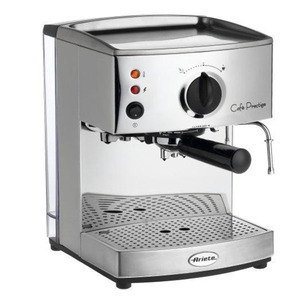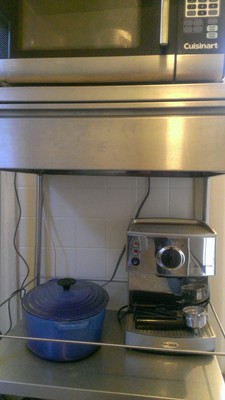February 28, 2013
When my wife and I moved from Philadelphia to San Francisco in 2010, we brought our espresso machine with us.

Back in Philly, we'd had a modest kitchen with just enough counter space for the machine. On lazy weekend mornings, I'd often turn it on and prepare us each a latte drink. It was a nice little ritual.
So we brought it to San Francisco with us. But our first apartment, a little studio we rented from a friend of a friend, didn't have the room for it. So the machine went into storage.
Then in 2011, we moved to our current apartment in the Mission. The espresso machine is back; but we don't have quite the counter space that we did in Philadelphia, so it's sitting on a little cart underneath our microwave, unplugged.

This isn't terribly inconvenient. To use it, I only need to pick it up and set it somewhere—say, on our table—then put it back when I'm finished. Still, the fact remains: I haven't used it once1 since moving here.
How strange, that such a small and seemingly insignificant detail could have such a disproportionate impact on our lives! Instead of plugged in and on the counter, the espresso machine is unplugged and a few feet lower. That's a small change. But now instead of using the machine every week or so, I never use it. That's a comparatively big change.
I've pondered this from time to time, and an idea that keeps recurring to me is that we humans are programmable. At least to an extent. Simply by recognizing that my internal decision-making circuitry seems to ignore the espresso machine when it's near the ground but will actually commit to using it when it's on the counter, I can alter my behavior by changing its location.
It's a silly example, but I think this is actually a really important lesson. The distinction here is essentially the difference between manual and automatic processes. With the espresso machine where it is now, making an espresso is a highly manual process for me—not just the act itself, but even having the idea to make one. Back in Philadelphia, because it was right there in front of me, the idea tended to just pop into my head. Automatically.
We are most effective when we are able to automate the things we do; that much is obvious. But getting software or robots to do all of our grunt work for us isn't the only kind of automation. The more we can reduce manual deliberation, and say to ourselves less and less, "Remember to do that"--i.e., the more we can automate the way we think--the more we can achieve.
I realize that aside from the espresso machine example this may sound a bit hand-wavy. I intend to address this notion in more concrete terms in a future post; for now I just wanted to get the idea out there.
-
That actually isn't the full story. The real reason I still haven't used it is that there's a part that we apparently lost somewhere between Philadelphia and here. But I've only included this detail in a footnote because it doesn't really change my argument; I only even noticed this part was missing after we'd already been in our new apartment for several months. So it's clear that I am not using the machine nearly as often as I used to. In addition, I'm hoping that by writing this post I will motivate myself to finally order a replacement for that part! ↩
